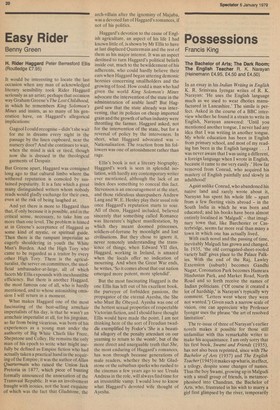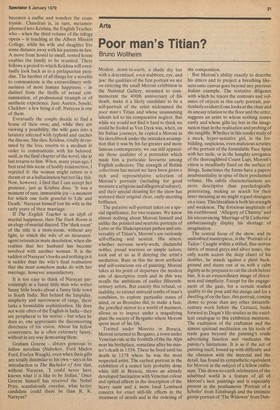Possessions
Francis King
The Bachelor of Arts; The Dark Room; The English Teacher R. K. Narayan (Heinemann £4.95, £4.50 and £4.50) In an essay in his Indian Writing in English K. R. Srinivasa Iyengar writes of R. K. Narayan: 'He uses the English language much as we used to wear dhoties manufactured in Lancashire.' The simile is perfect. Asked in the course of a BBC interview whether he found it a strain to write in English, Narayan answered: 'Until you mentioned another tongue, I never had any idea that I was writing in another tongue. My whole education has been in English from primary school, and most of my reading has been in the English language . . . I was never aware that I was using a different, a foreign language when I wrote in English, because it came to me very easily .' How far removed from Conrad, who acquired his mastery of English painfully and slowly in adulthood!
Again unlike Conrad, who abandoned his native land and rarely wrote about it, Narayan has spent his whole life — apart from a few fleeting visits abroad — in the South India in which he was born and educated; and his books have been almost entirely localised in `Malgudi' — that imaginary town that, like Barchester or Casterbridge, seems far more real than many a town in which one has actually lived.
With each novel and the passing of time, inevitably Malgudi has grown and changed. In 1935, 'the old corrugated-sheet-roofed variety hall' gives place to the Palace Palkies. With the end of the Raj, Lawley Extension (suburb) becomes Gandhi Nagar, Coronation Park becomes Hamrara Hindustan Park, and Market Road, North Road and so forth receive the names of Indian politicians. (`Of course it created a lot of hardship,' is Narayan's typically wry comment. 'Letters went where they were not wanted.') Given such a narrow scale of vision, one can appreciate why Professor Iyengar uses the phrase 'the art of resolved limitation'.
The re-issue of three of Narayan's earlier novels makes it possible for those still unfamiliar with this remarkable writer to make his acquaintance. I am only sorry that his first book, Swami and Friends (1935), has not also been reprinted, since with The Bachelor of Arts (1937) and The English Teacher (1945) it makes up what is, in effect, a trilogy, despite some changes of names. Thus the boy Swami, growing up in Malgudi with a small group of friends, is metamorphosised into Chandran, the Bachelor of Arts, who, frustrated in his wish to marry a girl first glimpsed by the river, temporarily becomes a sadhu and wanders the countryside. Chandran is, in turn, metamorphosised into Krishna, the English Teacher, who — when the third volume of the trilogy opens — is teaching at the Albert Mission College, while his wife and daughter live some distance away with his parents-in-law. A move from hostel to small, rented house enables the family to be reunited. There follows a period to which Krishna will eventually look back as to a prelapsarian paradise. The hardest of all things for a novelist to communicate is the extraordinary ordinariness of most human happiness — as distinct from the thrills of sexual consummation, of professional triumph or of aesthetic experience. Jane Austen, Soseki, Chekhov: a few bring it off. Narayan is one of them.
Eventually the couple decide to find a house of their own; and, while they are viewing a possibility, the wife goes into a lavatory infected with typhoid and catches the disease. She dies. Krishna, totally devastated by the loss, resorts to a medium in order to communicate with his beloved, until, in the final chapter of the novel, she at last returns to him. When, many years ago, I first read this scene of bodily resurrection, I rejected it: the woman might return in a dream or as a hallucination but not like this. Now, however, I find that I can accept her presence, just as Krishna does. 'It was a moment of rare, immutable joy — a moment for which one feels grateful. to Life and Death.' Narayan himself lost his wife in the early years of their marriage.
If The English Teacher is an idyll of marital happiness, then The Dark Room is an elegy of marital discord. The 'dark room' of the title is a store-room, without any light, to which the wife of an insuranceagent retreats in mute desolation, when she realises that her husband has become involved with another woman. It is the saddest of Narayan's books and nothing in it is sadder than the wife's final realisation that she must somehow make do with her marriage, however unsatisfactory.
It is too easy to think of Narayan patronisingly as a funny little man who writes funny little books about a funny little town in South India. But behind the limpidity, simplicity and narrowness of range, there lurks a formidable sophistication. He does not write often of the English in India — they are peripheral to his stories — but when he does so, one appreciates the disconcerting directness of his vision. About his fellow countrymen, he is often extremely funny, without in any way demeaning them.
Graham Greene — always generous to fellow novelists (Nabokov, Ford Madox Ford, Evelyn Waugh), even when their gifts are totally dissimilar to his own — says in his introduction to The Bachelor of Arts that, without Narayan, 'I could never have known what it is like to be Indian.' Once Greene himself has received the Nobel Prize, scandalously overdue, what better candidate could there be than R. K. Narayan?































 Previous page
Previous page